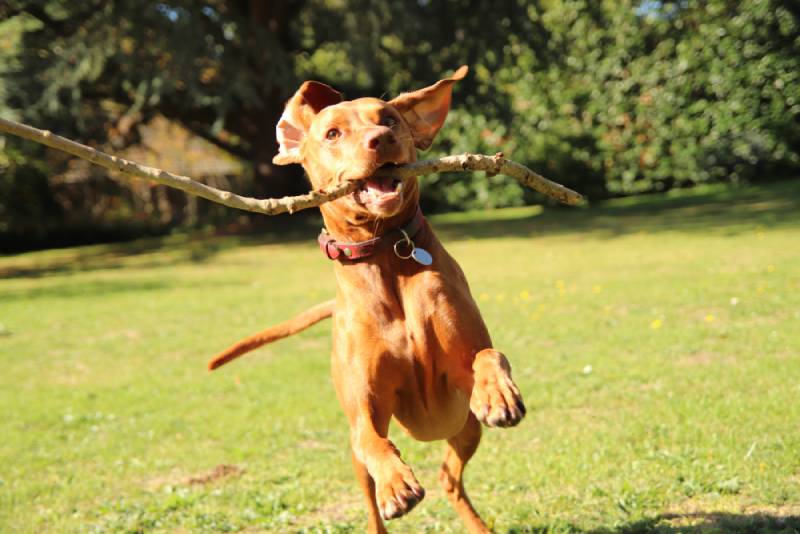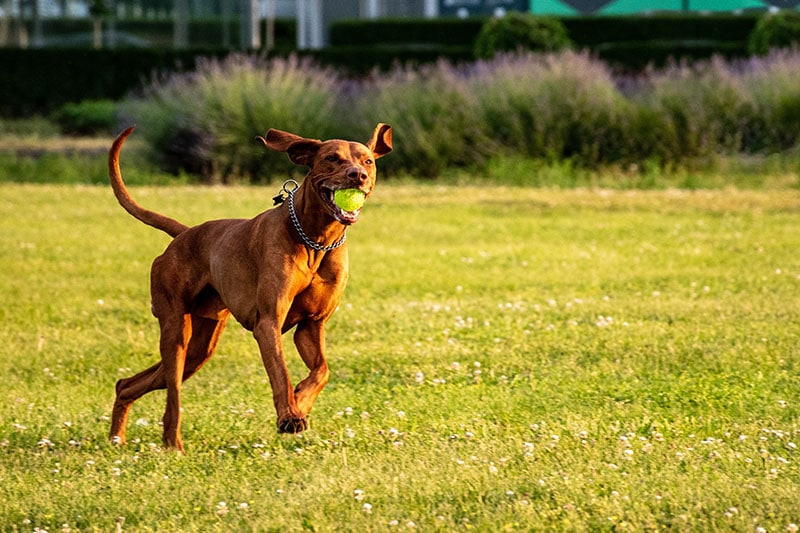In this article
Vizslas have come a long way since their beginnings as Magyar hunting dogs over a thousand years ago. While their curiosity, loyalty, and stamina remain constant, they temper that ruggedness with a tender, affectionate, and peaceful personality in the home. They’re well-mannered around others, and thankfully, they don’t bark much when trained and socialized.
Training is crucial, as Vizslas have the potential to get quite vocal when they feel uncomfortable or lack discipline. If you’re worried about the noise level from your new Vizsla, you have several methods to reduce the volume. We’ll explore whether Vizslas bark a lot and why they might decide to make their voices heard.

Do Vizslas Bark a Lot?
Vizslas are average barkers at most. When well-trained and socialized, they often use their voice purposefully and sparingly, a desirable trait from their gun dog background.
Still, the cliche rings true that all dogs are different. Some Vizslas can sit in one spot without making a peep, regardless of what’s happening around them. Others whimper, whine, and bark at the tiniest provocation.
Vizslas are intelligent and likely to speak up when they want their way. As Velcro dogs, they can be extremely needy. They’ll prefer whining to communicate in many cases but may bark more often as they find their grown-up voice.


Why Do Vizslas Bark?
Vizslas bark because they are uncomfortable, offering a warning, or trying to communicate a need. They are not aggressive or threatening with other people or pets. Rarely will they bark if there isn’t an immediate perceived threat or some source of aggravation.
An overly vocal Vizsla may be a personality quirk you must learn to manage. But in many instances, you can take steps to lower the volume, starting with identifying why your Vizsla is barking in the first place. Here are a few common reasons a Vizsla might bark.
1. Alertness
With a protective nature, many Vizslas will sound off if someone encroaches on their owner’s territory. A doorbell ringing or someone walking close to a window can get a Vizsla barking, alerting you to any action nearby.
However, that doesn’t make them good guard dogs. Vizslas may be curious, energetic, and distractible, but they’re relatively mild-mannered dogs around strange people and animals. Their bark is essentially the beginning and end of their aggressiveness, making them decent watchdogs at best. If an intruder gets into the house, a Vizsla will be more likely to lick and play with them than try to attack.

2. Separation
Separation anxiety isn’t uncommon in Vizslas, who are known for their affection and need to be with their people. They are not dogs for the kennel. When left outside too long, they can get antsy and anxious, often barking at the door to get attention out of frustration.
Barking during outdoor separation is an expected stress response and communicative behavior. If you leave your dog in an unfamiliar place, they’ll likely resort to barking quicker, whereas if you crate them at home before leaving for work, they’ll often whine and whimper continuously.
Barking can happen in the crate, especially if external stimuli may be threatening or interesting. But Vizslas, like many other dogs, will typically bark more out of protest than out of loneliness. Unless they have separation anxiety, which might cause extended bouts of uncontrolled barking, you can often get a Vizsla to keep relatively quiet in their crate with consistent training.
3. Fear
Nothing can ignite a Vizsla’s barking like a fear-inducing crack of lightning. Vizslas don’t grow accustomed to infrequent and unpredictable loud noises, sudden movements, and other startling stimuli, so barking out of fear is a typical response.
An unsocialized Vizsla will generally be more prone to barking out of fear at everyday stimuli. Strange noises or items will be more likely to set them off, as will interactions in public. Diverse experiences can help your dog better understand how to react appropriately in new situations.

4. Boredom
Vizslas are extraordinarily active dogs. They are easily distracted, quick to chase, and overflowing with energy. You must give them plenty of exercise outside the house and even more mental stimulation inside. They need enough toys and activities to keep themselves occupied before they can resort to more undesirable behaviors.
A dissatisfied, bored Vizsla is a destructive dog. Typically, boredom will manifest in the worst kinds of outlets, like ripping up furniture. If they bark, it will often come beforehand to let you know they need attention.
5. Excitement
Vizslas will bark during play or even when the idea of play crosses their mind. Barking in training classes is a perfect example of when a Vizsla might bark out of excitement. Seeing other dogs and wanting to play, they’ll bark if they’re stuck sitting in one place on a lead. The same anticipatory barking might happen while you’re grabbing a leash to go outside or when you get home from work.


How to Keep Your Vizsla From Barking
Socialization and proper exercise are fundamental with any dog, and they’ll help tremendously in keeping your Vizsla from barking. Being such a resigned breed, they won’t bark out of unnecessary aggression, making it easier to help them through various potentially distressing situations. More socialization with dogs and exposure to novel stimuli will make them less likely to bark out of fear or alertness.
1. Distraction
Preventing actions from happening should reduce your dog’s desire and reflex to do them. If your dog gets agitated and gets ready to bark as someone approaches the door, pull them away with the “come” command or have them focus on a toy. Get them out of the habit of barking by diverting their attention elsewhere.

2. Ignore the Behavior
Attention-seeking is a common reason Vizslas bark at their owners. As a learned behavior, ignoring the barking becomes critical to avoid reinforcing it. Look away, walk away, and act indifferent. Once the barking ends, you can engage and reward your dog for being quiet.
Although you should ignore the barking behavior, you can’t always brush off the reason behind it. If your Vizsla is barking at night because they need to go to the bathroom, you can’t act like they don’t exist and expect everything to turn out well.
When you can’t ignore the reason, you can at least avoid rewarding the barking. For instance, the late-night potty break should be quick, deliberate, and unceremonious. Ideally, you’ll get used to the timing and understand what’s sparking the barking so you can address it before it happens.
3. Training at Home
Crate training and basic commands can make all the difference in overcoming specific barking causes. Creating a sense of comfort and safety in the crate can help your dog get used to your absence and curtail any anxiety-related barking.
Build positive associations with the crate, and gradually increase your time away from your dog while keeping them crated. They’ll whine and whimper initially but eventually become accustomed to spending several hours alone.
Frustration is another potential cause of the barking, which is where commands can teach patience and manners. Vizslas will want to engage other dogs in play or speak up if they see something interesting on the other side of a fence. If they feel like someone is denying them something they want, they’ll bark in protest.
Teaching your Vizsla to “come” or “sit” gives you the option to direct your dog when they begin showing frustration or excitement. Cutting more to the point, you can also teach a “quiet” command to get them to pipe down.

4. Professional Training
Consider a trainer when you’re not getting results from your efforts to cull the barking episodes. A professional can provide the direction your dog requires and the support you need to reinforce positive habits in the home. It’s also another excellent socialization opportunity. Given the Vizsla’s trainability, you should see fast and reliable results.

Final Thoughts
Vizslas can show exceptional grace around others, and their non-aggressive demeanor lends to a relatively mild amount of barking. Still, they’ll have no issue finding a reason to get vocal, whether it’s someone walking up the driveway or your lack of adequate attention. Find the patterns in why your Vizsla barks a lot, and give them the attention and training they need to keep calm and quiet down.
Featured Image Credit: anetapics, Shutterstock























